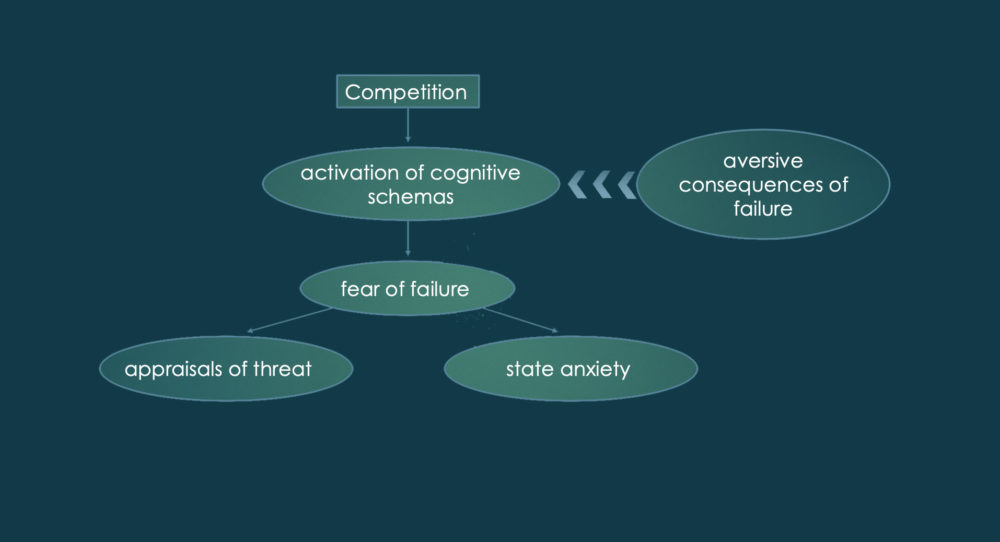Among the many emotions that are elicited by competitive environments, fear of failure is a construct that has received most attention. In literature, it has been conceptualized as “a dispositional tendency to experience apprehension and anxiety in evaluative situations because individuals have learned that failure is associated with aversive consequences” (Conroy & Elliot, 2004). Once the construct was defined, it was only logical to determine the causality that explains its appearance and the nature of its influence on behavior.

Regarding the process that generates fear of failure, there is a hierarchical model that posits that it results when the subject is faced with a situation that involves some form of evaluation. The appraisal of this situation facilitates the activation of cognitive schemas about aversive consequences of failing, which generates fear of failure (Conroy & Elliot, 2004).
In regards to CrossFit, I’ve always heard some athletes say that failure is a valuable learning weapon, and this is absolutely true; but what about those who have developed fear of failure? In hopes of keeping positive sensations in training or competition, they usually shy away from barging into the unknown if they aren’t certain of their proficiency. As a result, they usually run a more conservative race during competition. Staying in your own lane may seem appealing but it’s not always the smartest thing to do. Patrick Vellner is well-known for his athletic prowess in the “sport of fitness” and strongly defends field awareness; which is, keeping a close eye on your competition during the event to monitor your pace so you can choose the right moment to push or cruise. But this must be done cautiously because the plan may backfire.
Take for example Jordan Troyan’s overhead squat event at the 2014 Games. He failed all three attempts and, during an interview later on, he said he had become frightened once he saw the weights other athletes were putting up. Obviously I don’t know what his game plan was prior to the event and I’m going out on a limb here but I wonder if he decided to start off with a lift he was absolutely confident with.

There is a time and place to experience fear in an event. And the consequences fear may have on us come down to inter-individual differences (yet again). So, how do I manage fear of failure when stakes are high? You can only learn by deliberately exposing yourself to failure. There are reasons to believe this is valuable for performance from a cognitive and behavioural point of view. In the cognitive sense, it is imperative that you figure out how you respond to your emotions, the nature of your self-statements and your go-to coping mechanisms (Lazarus, 2000). On a more behavioral level, repeated exposition will ultimately decrease the intensity of your fear response, making it easier to manage your emotion. Although this last element hasn’t be researched per se, it’s basically a hunch of mine which I’ll get into later on.
“You are what you do”
During the 60s there was a strong interest towards the behavioural aspects underlying human action. Behaviorism considered action as completely dependent on reward or punishment provided by the environment. Granted this consideration goes a little too far for my personal taste, there are many findings from this period that have proven to be very valid when understanding the nature of human behavior.
These studies not only considered the causal factors of behavior but also modification techniques. This is how Behavior Modification was born. Among these techniques there is one in particular that has always peaked my interest: exposition. It is used in situations where the subject experiences intense levels of anxiety and has developed a tendency to escape or avoid the stimulus.
As the name suggests, the exposition technique consists of exposing the subject to the feared stimulus repeatedly and for a long period of time; just enough for anxiety to peak and then decrease towards reasonable levels. I won’t really get into the real technical stuff regarding exposition but I have always wondered if it can be done at a more basic level; that is, in shorter periods of time and regarding fear of failure and not so much anxiety (because anxiety and fear are not the same thing, but that’s not today’s subject).
Conroy & Elliot (2004) considered fear of failure and trait test anxiety to be “conceptually equivalent constructs” which leads me to believe that if exposition works with anxiety, it could work with fear of failure as well. The premise for this technique is that the subject has developed such an intense fear of the stimulus at hand (failure in the case) that she or he avoids or escapes the situation. This behavior allows for an immediate sense of relief which basically tells the brain: “hey, if we get the hell out of here, we feel a lot better”. The brain gets the message and decides to predetermine this response for future similar events. The whole point of exposition is to cut this pattern, obligating the subject to face the feared stimulus, allowing themselves to experience the anxiety for as long as necessary in order for the intensity of the anxiety to decrease. This will teach the brain that the emotional response derived from the situation will ultimately be of calmness. Naturally this technique calles for numerous long sessions and it doesn’t guarantee anxiety will be forever lost; but it will push it towards a a more manageable level.
“I see things how I am, not how they are”
In contrast, Cognitive Psychology erupted on the scene in the 70s to take my heart along with it. I am a huge fan of the cognitive aspects that rule behavior and, inevitably, turn to these factors when considering the causation of human action.
In relation to fear of failure, Richard Lazarus, an author who has received great renown given his contribution to the field of emotion, developed a cognitive-motivational-relational theory. This theory established that emotional response acts upon three levels: subjective experience, actions or impulses to act and physiological changes and that this triple response must include the cognitive, motivational and relational variables that linger beneath it and ultimately cause it (Lazarus, 2000).
Lazarus’ frame of work set the stage for Conroy and Elliot to develop the hierarchical model I previously mentioned, that considered fear of failure to be a byproduct of cognitive schemas that contained the aversive consequences of failure (disappointing important others, shame and belittlement, decrease in self-esteem, losing important others’ interest, etc…). Also, they established that this fear of failure was directly related to trait test anxiety; which basically means that individuals who generally fear any form of external evaluation – situations where their behavior is subject to judgement – will necessarily tend towards fear of failure.
From this cognitive standpoint, we know that competition is affected by three pivotal aspects: motivation, concentration and attention. Fear of failure leads to negative self-talk and this will take hold of our attentional resources, derail our concentration and diminish our motivation.
As a solution, Lazarus (2000) proposes that athletes take time to analyze the emotions they feel during competition as well as their vulnerability to them and coping strategies. Why? Simple. An efficient coping strategy during competition when things aren’t go as planned will allow you to “become re-motivated and, thereby, capable of attending and concentrating effectively to display their typically high standard of excellence” (Lazarus, 2000).
What coping skills are needed to overcome destructive self-statements? That’s something that can only be answered from within. Competitors must be faced with situations in which they experience negative emotions in order to “practice” coping strategies that lead them away from counterproductive actions that appear in response to those negative emotions. We’ll get into the different types of coping strategies soon enough…
Failure is just as important as achievement
This is just a general recommendation (not only applicable to sports). Failure plays a huge role in everyone’s lives and will remain present. Many times failure will be associated to a task that isn’t relevant in relation to our realization goals but other times it will affect the way we perceive ourselves and it may lead to an existential crisis. It’s important that we learn to identify and cope with these situations in order to move on without losing ourselves in the process. Don’t fear failure…fear not knowing how to get up!
Conroy, D. E., & Elliot, A. J. (2004). Fear of failure and achievement goals in sport: Addressing the issue of the chicken and the egg. Anxiety, Stress & Coping, 17(3), 271-285.
Lazarus, R. S. (2000). How emotions influence performance in competitive sports. The sport psychologist, 14(3), 229-252.

